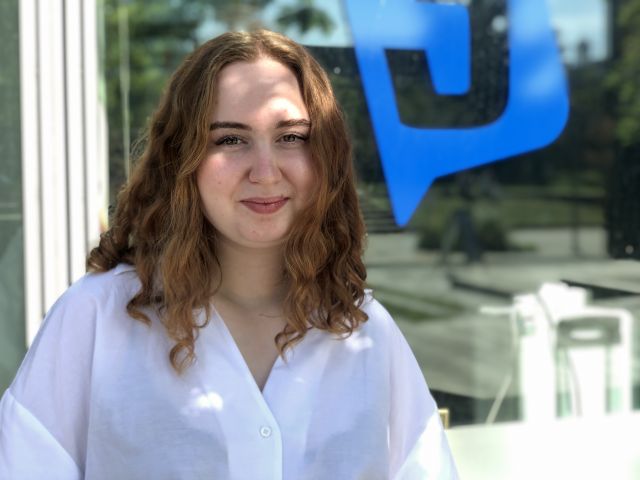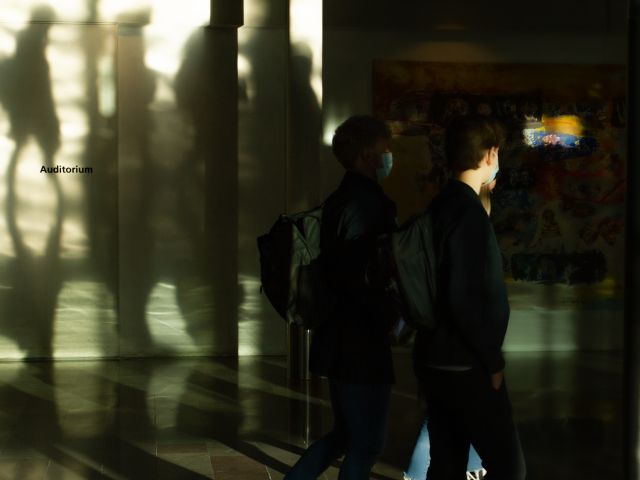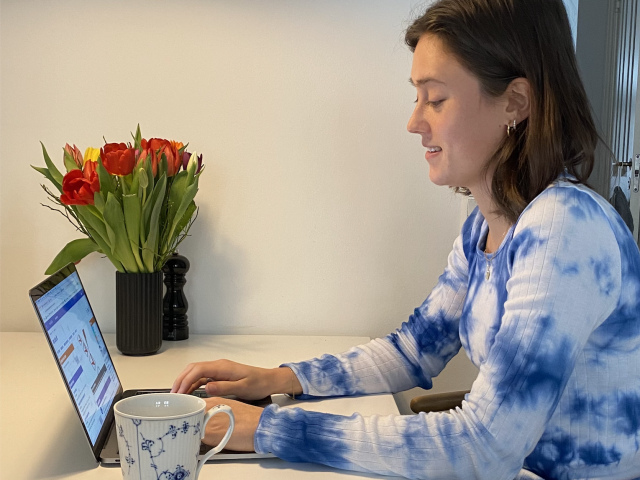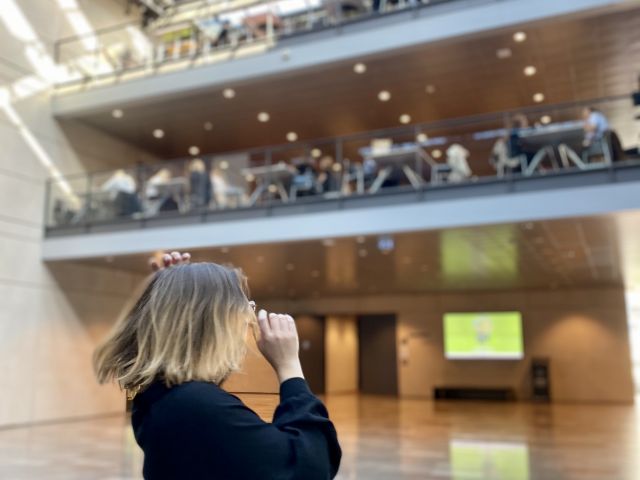Online teaching: “CBS is and will remain an on-campus university”

(Photo by Lisbeth Holten)
Students and teachers are back on campus after three semesters of lockdown and online teaching. Where is CBS heading? CBS’ Associate Dean for Technology-Enhanced Learning and CBS Students’ two Vice Presidents explain their views. They are sure of one thing – CBS will not become a university in the cloud.
Several times a day on weekdays, the doors to the many auditoriums at Solbjerg Plads swing open and out swarm crowds of students. The buzz of their voices fills the halls that for the past three semesters have been either silent as the grave or on half their regular volume.
Everything seems to have returned to normal, but then again, how can that be possible?
According to surveys conducted among CBS teachers and students, three semesters of 50% to 100% online teaching have equipped the teachers with better IT skills, and the students are still interested in pre-recorded videos and enjoyed the flexibility of when and where they could attend classes. Yet, the time away from usual campus life has affected students’ wellbeing.
CBS WIRE has reached out to CBS’ Associate Dean of Technology-Enhanced Teaching, Annemette Kjærgaard and CBS Students’ two Vice Presidents, Maria Gabriela Zoladkowska and Tomas Vemola, for an interview on what role online teaching should play in the future.
And two things are certain; the pandemic has changed teaching – but it will not turn CBS into an online university.
“Teachers can go back to business as usual, but honestly, was everything that great before the pandemic? Everyone has realized that things can work out differently – and in some cases, even better. And I think our students feel the same. That some things just work better online – such as shorter, well-produced videos that prepare students for their next lecture’s homework,” says Annemette Kjærgaard and continues:
“That being said, our strategy is that we are and will remain an on-campus university.”
Right now, I think we’re witnessing a sort of whiplash effect, where everybody just wants to go back to having everything on campus
Tomas Vemola
Tomas Vemola himself has experienced the highs and lows of three semesters with mostly online teaching, and although he liked its flexibility, he clearly sees a pull away from online teaching, for the time being.
“Right now, I think we’re witnessing a sort of whiplash effect, where everybody just wants to go back to having everything on campus. But some things just work better online. However, the decision about whether something goes online or not should be made as close to the students as possible – by the course coordinators in collaboration with the study boards,” he says.
Well-being comes first
On September 10, CBS hosted a seminar outlining the main points from three surveys on teachers’ and students’ experiences during the past three semesters. And one topic in particular received a lot of attention, explains Annemette Kjærgaard, who joined the seminar.
“The pandemic has shed light on the importance of wellbeing, and the fact that some types of learning environments don’t suit everyone. We have thought about this previously, but the pandemic emphasized how learning depends on social interaction and socializing,” she says.
And this knowledge will be important in future when discussions highlight the balance of online versus offline teaching that CBS should strive for.
“It’s hard to predict the situation far into the future, but I believe we will see more online elements, but with the add-on that students might sit together. But the need to be together and talk together physically is equally important. Perhaps campus will look different, with fewer big auditoriums, and more spaces that support discussion, dialogue and learning communities. In that sense, online teaching will impact how we design our campus,” says Annemette Kjærgaard.


Maria Gabriela Zoladkowska does not view the use of online teaching with reluctance. However, during the lockdown, she realized how much attending CBS in person means to her.
“Having experienced the feeling of being in a packed classroom, I realized how much I missed that. I missed the students’ and teachers’ engagement. And although I could visit the library to study, it just wasn’t the same, because I was there on my own. And not with my classmates,” she says.
CBS – a global competitor
Tomas Vemola expects online teaching to play a more extensive and international role at universities in the future.
“Maybe we will have more hybrid classes where some students are present and some are following classes from home. That, of course, requires we have the equipment, technology, and skills for it. Offering hybrid and online content to the students, or even on some online platforms is a completely different ballgame than on-campus teaching,” he says and continues:
“We are one of the best business schools in Europe, but it remains that online teaching requires a completely different set of skills that we have just started developing. And other universities have been experimenting with offering their classes on platforms like edX for years.”
That said, Tomas Vemola is not afraid that CBS will become an exclusively online university.
“I have considered that, but I don’t think it’s likely. You have to include the quality of the content, and online lessons do not always reflect the quality of on-campus teaching,” he says.
Press play
Maria Gabriela Zoladkowska has been especially pleased with the pre-recorded videos and recorded lectures that she has been able to revisit.
“I have realized that there is an opportunity on Canvas to watch the pre-recorded lectures that were prepared for students last year, so I can revisit my current classes, which are in person, afterwards as well,” she says.
Now the question remains whether it is a service that CBS will keep delivering to its students.
“Some universities regularly record lectures, and even so, the students show up for lectures in person. Maybe in time, CBS could offer the same. The key here is that we listen to the students’ wants and needs and adjust to them,” says Maria Gabriela Zoladkowska.
I’m also quite interested in seeing whether the students would rather not be on campus – I really hope not
Annemette Kjærgaard
Annemette Kjærgaard explains that CBS is not planning to record all classes held on campus for several reasons.
“During the lockdowns we saw that two-hour lectures just don’t work. Students lose concentration and motivation. Therefore, we’re not planning on recording campus lessons. We would rather produce shorter videos that either prepare students for the teaching material or highlight points from a lecture,” she says and continues:
“This is also partly to do with the technology available. At the seminar on September 10, we tried to use a hybrid format so people at home could attend, but we kept running into lagging issues. It’s not that we don’t want to stream the lectures at all, we do so on the cand.merc.aud course, but it’s not top of our wish list.”
On the one hand, we have students’ wishes, and on the other, what CBS can demand from its teachers. For example, will all teachers be required to offer online teaching?
“I’m not so sure about this. I think that it will be part of the skillset that we will request when recruiting. So teachers can deliver teaching in various formats – including online formats that we support at CBS. But I don’t know whether that should be required of everyone. We have not discussed the subject, but it could be interesting,” says Annemette Kjærgaard.
Online teaching is here to stay
Although various technologies and tools are already being used successfully in a teaching and learning setting, Tomas Vemola and Maria Gabriela Zoladkowska see this post-pandemic period as a time of experimentation.
“When new teaching methods emerge, we must be careful not to throw the baby out with the bathwater and fully commit to them immediately. We need to experiment with them, share knowledge and figure out what suits our teaching best,” says Tomas Vemola.
Maria Gabriela Zoladkowska adds:
“Online teaching is here to stay, for sure. But we should not forget the importance of the learning we get from being on campus.”
Look ahead, Annemette Kjærgaard is curious to see how the new technologies will shape both the teaching being conducted and life on campus.
“I hope we will use the technology as a means of interacting more with students, so that they become even more engaged in teaching. The types of classrooms we have may not actively support being present and getting to know one another, but perhaps the new technologies can promote more social interaction,” she says and continues:
“I’m also quite interested in seeing whether the students would rather not be on campus – I really hope not. But perhaps that also depends on how we design and furnish our campus. Perhaps new generations want something completely different.”




































































































































Comments